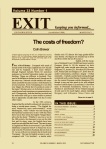 In the recent edition of our print magazine, we published a thoughtful essay by one of Britain’s most eminent psychiatrists, Dr Colin Brewer. In his lead article, Brewer examined suicide trends over the years and asked what difference, if any, the access to means or information makes to suicide rates. But beyond this, he asked an even more difficult question: whether the means of suicide should be completely outlawed even if it is abused.
In the recent edition of our print magazine, we published a thoughtful essay by one of Britain’s most eminent psychiatrists, Dr Colin Brewer. In his lead article, Brewer examined suicide trends over the years and asked what difference, if any, the access to means or information makes to suicide rates. But beyond this, he asked an even more difficult question: whether the means of suicide should be completely outlawed even if it is abused.
Most members of society’s like EXIT follow robust and happy, fulfilled lives. If one day they are faced with unbearable and unrelievable suffering, should they be forced to endure a drawn-out and degrading dying to ‘protect’ those who might abuse freedom? We could prevent most road deaths by requiring all vehicles to travel at the speed of horse-drawn carriages. “But almost everyone seems to accept that this annual carnage is a price we can and should accept in the interest of personal freedom and economic necessity.” Similarly, few people called for gas ovens to be banned when they were becoming a common means of suicide. In the USA, even massacres of schoolchildren seem unlikely to lead to more than minor changes in the well-entrenched gun culture.
And what of the Internet? Says Brewer, “The e-genie has been out of the e-bottle for a long time and there is not much that we can currently do to put it back.” This is particularly relevant at a time when well-meaning but often misguided pressure groups are harrying the government to ban websites relating to suicide information. True, there is some small, debatable evidence linking Internet addiction statistics and suicide. Partly the idea that someone can read about a suicide method and impulsively put it into effect. But most studies refute the idea on the grounds that although such regrettable deaths might seem impulsive, the truth is that the persons have been thinking about it and planning for a long time. This is an important point for suicide intervention programmes. But also raises a worrying point for Exit: by making access to information on painless and ‘safe’ methods of suicide harder to come by, the authorities are often abandoning suicidal individuals to dangerous and painful deaths. Hence the rise in ‘detergent’ suicides – which also endanger the lives of paramedics and fire service. If someone is determined to end their own life, and all suicide intervention programmes have been ineffective, and nothing anyone says is going to stop them, would you rather that person managed to die painlessly or would you see them die in agony?
Most methods of suicide are freely available on the Internet. Not from this site – but from underground newsgroups that tend to give poor quality information. Such groups are hard to track down and do something about, so instead people often vent their anger at a respectable, established organisation that upholds the wishes of more than 80% of the population – a group like Exit.
Every human life is valuable. But freedom to act, to decide one’s own destiny, is at the core of what we value about life. It gives life dignity and meaning.
Further references:
- Smith A, Witte T, Teale N, King S, Bender T, Joiner T, Revisiting Impulsivity in Suicide, Behav Sci Law 2008; 26(6):779-797.
- Currier D, Internet and Suicide, in: Quigley M (ed), Encyclopedia of Information Ethics and Security, Information Science Reference 2007, 384-390.
- Preventing Suicide: A Resource for Media Professionals (World Health Organisation, 2008).






